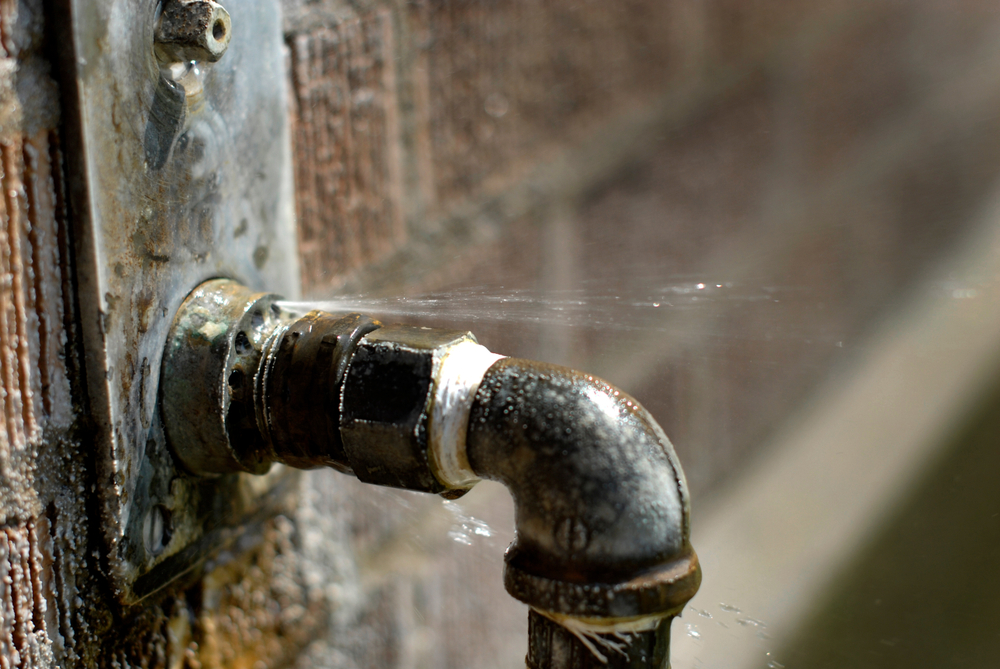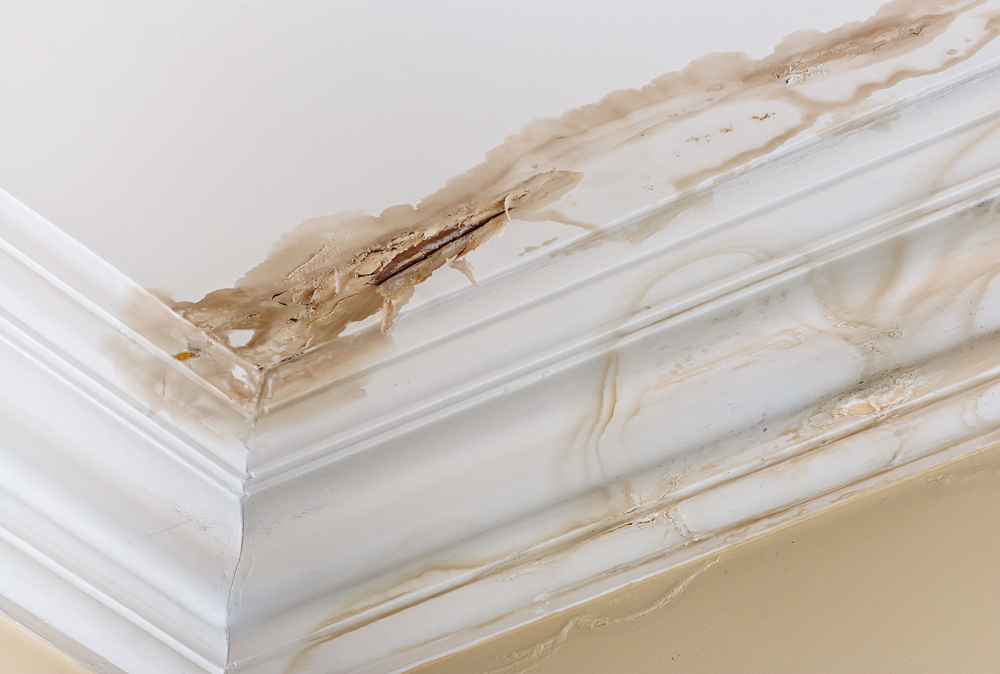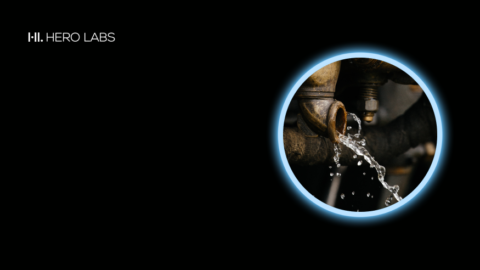
If you were to ask a hundred people on the street what they thought was the biggest threat to their home, firstly, they would probably think you were a bit odd, and secondly, chances are they would talk about things like fires, burglars and maybe storms or floods.
But it might surprise you to learn that, according to the Association of British Insurers (ABI) – the chaps who compile statistics from across the insurance industry, and no doubt are great fun at parties – the number one cause of damage to homes in the UK is in fact:
Water leaks.
Specifically, “escape of water”, which means the kind of leaks that come from faulty plumbing and appliances. According to the ABI, escape of water actually causes more damage than house fires and burglaries combined, on an annual basis.

We have smoke alarms to help protect us against fires, and many homes have security alarms to fend off burglars. But when it comes to leaks, what can you do? First off, we may be biased, but we strongly recommend fitting a leak alarm like our very own Sonic! A good home insurance policy can also provide an excellent safety net, but not all insurance policies are created equal. Water damage can do much more than ruin your floorboards, and it’s important to understand what your policy does and doesn’t cover so you can take preventative measures when it comes to looking after your most valuable possessions.
Does home insurance cover you for water damage?

Do you read the fine print? Not many people do, as illustrated by a marvellously tongue-in-cheek study by two American Universities last year. Researchers at the Universities of Connecticut and Toronto circulated an advert for NameDrop, a hot new social media platform; they succeeded in signing up 543 students who in doing so submitted their consent to the terms and conditions of the service. They agreed to receive relevant offers by email from time to time; to not use the platform for criminal activities; and somewhere around paragraph 2.3.1, to unconditionally hand over their first-born children (current or future) to NameDrop.com.
Fortunately for them, NameDrop.com doesn’t exist. But it does quite elegantly illustrate the need to understand what you’re signing up for before putting pen to paper. In a similar activity, this time for an April fool’s prank, UK game retailer GameStation managed to claim the eternal souls of 7,500 unsuspecting shoppers. But perhaps the most wholesome example comes from Donelan Andrews of Georgia, USA, who managed to win 10,000 U.S. Dollars just by reading the fine print.
Planning a getaway to England, Donelan purchased travel insurance from lesser-known provider “Tin Leg”, and when the policy arrived she sat down to read it. Somewhere between the end of page seven and jargon-induced catatonia were the words “It Pays to Read the Contract”. It continued: “We estimate that less than 1 percent of our customers actually read all of their policy information — and we’re working to change that. The first person to email us and mention this clause will win $10,000”. Andrews emailed, and the very next day a representative from Tin Leg called her to say she was the lucky winner and asked where to mail the cheque. Lucky for some! “I might start buying lottery tickets”, says Andrews, “although only after I’ve read all the fine print”.
The moral of the story is, if you can bear it, it does usually pay to try to understand the ins and outs of something like a home insurance policy. The main questions you’re looking to answer are:
- Does your insurance cover the cost of finding the leak and accessing it?
- Does your insurance cover the cost of repairing the source of the leak and any damage caused when accessing it?
- Will your insurance cover the cost of the water damage to property and possessions, and do you have to do anything to validate your cover – like take certain actions before leaving your home unattended for a time?
For example: a big stain appears on your living room ceiling. Is it coming from plumbing in the ceiling void? From the bathtub? From the shower? You call out a plumber, but he’s got bad news for you: the bath and shower tray are both tiled in, and there’s tiles on the floor too – so he’ll have to get the hammer out and cause some damage before he can begin to fix it. Will your insurance cover that, or just the damage directly caused by the leak? What about if he gets it wrong once, twice, or after he’s torn up all three you discover it’s not plumbing at all and somehow the water is coming in from outside?
That process is called “trace and access”, and you can’t necessarily assume it’ll be covered. Load up your policy in a digital format – most insurers email you a PDF nowadays – and take a few minutes to search for terms like “trace and access”, “water damage”, “leaks” and “escape of water”. CTRL and F is your friend here (or CMD + F for our mac-using friends)!
Home is where the art is
“Home insurance” is a bit of a misnomer in itself – there’s really two products to worry about, buildings insurance and contents insurance. The former protects the fabric of the building; the latter the “things that aren’t nailed down” – personal belongings like clothes, jewellery, electronics and artwork.

A good contents insurance policy will help you pick up the pieces after a water leak, but again there can be more than meets the eye. First off, your insurer might be very interested in how the leak came to be. A faulty washing machine or a pipe giving out due to wear and tear is classic “escape of water”. If you left the bath running and flooded the house, they’re likely to call that “accidental damage”. Accidental damage cover is often an extra, so there’s a good chance it’s not included in a standard policy and you’d be high and dry. Or… low and wet. Either way it’s bad. Your insurance might say that you need to run the heating if the temperature falls below a certain point, or stipulate a maximum time you can leave the property unattended. If you don’t follow along there’s a risk they will “decline” your claim.
Another thing to look out for is how your insurer will pay a claim. Some will directly replace items for you using their own suppliers; some will give you a cash equivalent – which is the one to watch, because a cash equivalent might mean factoring in deprecation, i.e. loss of value over time. Many insurers frame it as: “how much would the item have been worth, if you had tried to sell it on the day it was lost?”. Items like jewellery hold their value almost indefinitely, so you’ll see a fair price. Not so with belongings like computers or sports equipment, which depreciate very steeply (if you’ve ever tried to sell and old laptop or phone, you’ll have experienced this first hand). It’s important to understand whether you’re getting “new for old” cover or a cash sum that reflects the market value of the piece at the time it was lost – which is rarely the same as the value it held for you. Which brings us on to our next topic:
The Things That Money Can’t Replace
- Items with sentimental value
Some things have little value, except to you. A family heirloom passed through generations; the ticket stub from the day you met your wife; a photo of your grandfather on the last day of the war. These things can never be replaced, so carefully consider where you choose to store them. Many people box them up and put them in the loft, but lofts can be damp and in older homes may well contain a big cylinder full of hot water. Those are particularly prone to failure, because of the constant expansion and contraction and the fact that you’re unlikely to notice any damage when they’re hidden in the loft. Try to site keepsakes somewhere dry and away from any potential water leaks, and take pictures of old photos so you can at least back them up to the cloud.
- Pets
Pets very quickly become members of the family, and the relationships we have with them are very important. Standard home insurance is very unlikely to cover vet’s bills caused by water damage, and if you own a pet you’ll know how expensive these can be. Some people take out separate pet insurance to smooth out any unexpected bills, although (you guessed it) you’ll want to read the fine print on these as well!
- Special jewellery and collectable items
Your home insurance policy is likely to come with a “single item limit”, i.e. the maximum value that will be covered on any one item, and it may well have individual values for things like jewellery, electronics and cash. You should double check your insurance to check what these limits are, and if they fall a long way short of the true value you could think about getting separate insurance for your most precious possessions.
- Property of any guests or lodgers staying in your house
Do you rent out a room to someone else to help pay your mortgage? Property of roomers, boarders, and other residents not related to the insured party are seldom covered by a standard homeowner insurance policy. If they don’t have renter’s insurance, you’ll have a very unhappy roommate if a leak totals their laptop or phone. Conversely, accidental damage caused by guests or lodgers (your mother-in-law leaves the bath running and floods the house) might also be exempt. It’s a bit of a minefield.
- Your precious time and peace of mind
Having to deal with a disaster like a flood or a fire is a very traumatic experience. Your home is your safe place, for you and your family; losing possessions is one thing, but the sense of security and belonging that comes with a family home is invaluable. Besides that, making a claim is a difficult and time-consuming process, and you might have to spend many hours on the phone to insurers, tradespeople and contractors trying to get everything arranged. After a big leak, your home may even be deemed “uninhabitable” and you’ll need to move out for an extended period while repairs take place. Where you end up is determined by your insurer, with some even offering to send you on holiday if you can take the time off work (!) – search your policy for “alternative accommodation” to find out what you’re covered for.
You can do your future self a favour by trying to document valuable things as you buy them – pictures of the item itself, the serial number and any receipts or paperwork showing what you paid for them. In the past, we’d have recommended emailing them to yourself with a relevant title like “insurance receipt” so you can find them again if you ever need to. Nowadays, most cloud backup services have “context aware” searching that will actually let you search for terms like “receipt” or “invoice”.
The easiest way to secure a home against water leaks
A solid insurance policy can be an excellent safety net, but prevention is far better than cure. As well as home insurance, most people take extra measures to protect their home – fitting smoke and heat alarms (and increasingly, fire blankets and fire extinguishers); perhaps adding a burglar alarm or beefing up the locks on their doors and windows if they’re worried about intruders. What many people don’t realise is that you can do the same for water leaks – with a smart leak detector like our very own Sonic. In the same way that a smoke detector watches out for smoke particles or changes in temperature that signal a fire, Sonic recognises unusual patterns in the flow of water throughout your home and sends a warning to your smartphone if there’s a problem. Sonic also includes a smart shut-off valve that can turn off the water at its source, containing the problem and limiting the amount of damage that can occur while the problem gets resolved. Sonic can even tell you which appliances take the most water to run, so you can stay on top of your bill and help to protect the planet, too. Can your smoke alarm do that?


